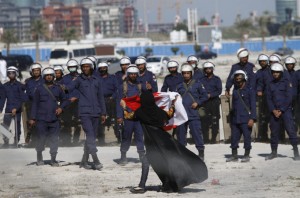Bahraini Repression Amidst a Failing Strategy
via IPS News
 This week’s decision by the Bahraini court of appeals to uphold the prison terms against Bahraini opposition activists is a travesty of justice and an indication that Bahraini repression continues unabated.
This week’s decision by the Bahraini court of appeals to uphold the prison terms against Bahraini opposition activists is a travesty of justice and an indication that Bahraini repression continues unabated.
Bahraini officials, when confronted with angry world reaction to the court’s decision, cynically hid behind the claim they would not interfere in the proceedings of their “independent judiciary”.
Despite the threat to U.S. national interests and the security of U.S. citizens in Bahrain and elsewhere in the Gulf, Washington remains oblivious to the ruling family’s violent crackdown against peaceful protesters in the name of fighting “foreign elements”. Pro-democracy Bahrainis are wondering what we are waiting for.
Because of our muted reaction to what’s happening in Bahrain, the ruling family and their Saudi benefactors have not taken seriously Western support for democratic transitions in the Middle East.
The United States and Britain maintain deep economic and security relations with these states but also enjoy strong leverage, including the U.S. Navy’s Bahrain-based Fifth Fleet, which they must revisit in the face of continued egregious violations of basic human rights by some of these regimes. Bahraini civil rights organisations and activists are expecting the United States to use its leverage to end regime repression.
Despite their pro-Western stance, there is nothing exceptional about the autocratic Gulf Arab regimes. And they should no longer be given a pass on the importance of democratic reform.
Staying in power will require Bahrain’s Al Khalifas and other Gulf tribal family rulers to do more than push a vicious sectarian policy and employ slick public relations firms. Their cynical and deadly game might buy them some time, but, in the end, they will not be able to escape their peoples’ wrath.
In the absence of genuine reforms in the next three years, the Gulf’s autocratic regimes will be swept aside by their peoples. The “people power” that emerged from the Arab Spring in Tunisia, Egypt, Yemen, Libya, and now Syria, cannot be kept out of these tribal states. In reality, they all have been touched by peoples’ demands for dignity and justice.
While Iran might be exploiting the protest movement to discredit these regimes, the pro-democracy movement in Bahrain goes back to the 1960s and 1970s – way before the Islamic Republic came on the scene.
Even more troubling for U.S. national security are the continued efforts by Al Khalifa to whip up anti-American attitudes among Bahrain’s more rabidly anti-Shia and xenophobic Sunnis. Bahrain and some of their Gulf Co-operation Council (GCC) allies perceive the growing rapprochement between the U.S. and the new Islamic democrats, such as the Muslim Brotherhood in Egypt and Tunisia, as a sign of tacit opposition to Gulf autocrats.
They believe the U.S will throw them under the bus if their peoples rise up against them. They also worry that if the nuclear issue in Iran is resolved, a possible U.S. rapprochement with Tehran would embolden their Shia communities in their struggle for equality and justice.
For 40 years, Prime Minister Khalifa has been the key opponent to reform in Bahrain. In recent ears, however, a new generation within the ruling family, known as the “Khawalids,” has taken up the anti-Shia, anti-reform, and anti-American cry.
They have used pro-government newspapers, blogs, and social media to vilify the Shia, the United States, and the pro-democracy movement. With tacit government encouragement, they frequently describe elements of the opposition as “diseased cells” that must be removed from society.
In the process, they have encouraged extremist Salafi and other Sunni groups to spread their message of divisiveness, sectarianism, and hate.
What Bahrain and the other Gulf sheikhdoms fail to realise is that when they encourage extremist groups to fight the “enemies” of the regime, a time will come when radical Salafi “jihadists” will turn against the regime. The Saudi experience in Afghanistan and Iraq should offer them a sobering lesson. This dangerous game does not bode well for their survival.
As domestic challenges also grow in Saudi Arabia, the Kingdom’s interest in Bahraini domestic policy will diminish. Recent estimates indicate Saudi oil exports over the next decade and a half will shrink significantly because of growing domestic needs for energy to generate power and desalinate seawater.
When this happens, Al Khalifa will have to face their people on their own.
- Emile Nakhleh is the former director of the CIA’s Political Islam Strategic Analysis Program and author of “A Necessary Engagement: Reinventing America’s Relations with the Muslim World”.
En Español
The Latest
 From IPS News
From IPS News- UN Live’s CEO Katja Iversen Talks About the Power of Popular Culture and ‘Sounds Right’
- Afghan Women’s Voices Stifled as Taliban Tightens Media Controls
- ‘Toasting the World’s Most Natural Talent’: UN Museum Campaign Recognizes NATURE’s Contributions to Music
- Urgent Global Action Is Essential To Stop Wave of Plastic Pollution
- Making the Global Financial Architecture Work for Emerging Markets and Developing Countries (EMDEs)
- Who Should be the Next UN Leader?PART 6
- The Summit of the Future Is a Rare Chance to Fix a Broken System: Civil Society Must Be Included
- Fine, Sanctions, or Waiver: Iranian Gas Will Come at a Price for Pakistan
- Portable Ginnery Could Revive Kenya’s Ailing Cotton Industry
- Who Should be the Next UN Leader?PART 5
- Online fundraising for IPS Inter Press Service at Razoo













